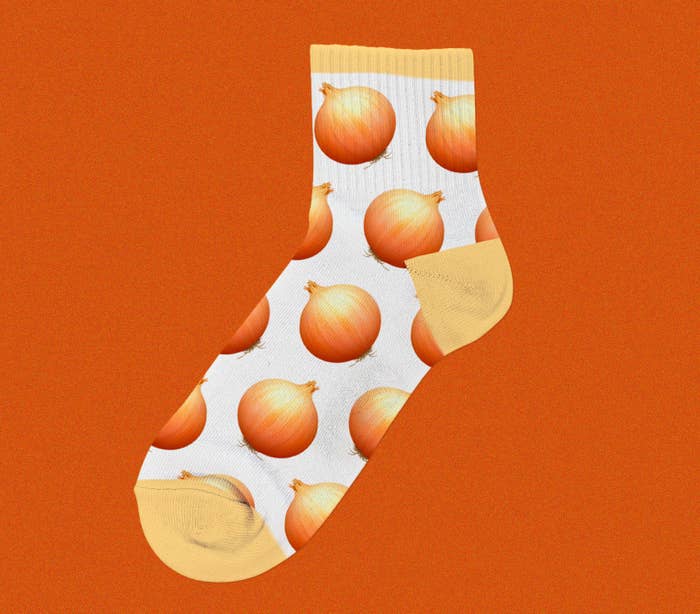
Being sick stinks, but sleeping with raw onions in your socks probably stinks even more. However, swarms of natural medicine buffs are trying it anyway in the hopes the vegetable will cure or alleviate respiratory symptoms.
Dozens of TikTok videos show people claiming that raw onions in your socks or a sick person’s bedroom can absorb viruses, bacteria, fungi, and possibly other “toxins” from the skin or air. Their premise is that onions might help congestion, cough, headaches, and other symptoms; some even claim the remedy helps with asthma and “negative energy.”
As groundbreaking as that would be, there’s just no evidence to support this, according to experts who spoke to BuzzFeed News, including a pediatrician, respiratory therapist, and former onion breeder.
“[I’m] often asked about a wide variety of home remedies, ranging from the effective to the bizarre,” Mandy De Vries, a respiratory therapist and director of education for the American Association for Respiratory Care, wrote in an email. “If nothing else, having onions in the house will make your food taste better! However, there are some more effective ways to prevent the spread of respiratory viruses.”
Recommendations for the home remedy usually make their rounds every year as temperatures drop and viruses circulate more. And year after year, a wide variety of experts repeat that there’s no scientific evidence that says the “treatment” actually works.
But non-COVID respiratory viruses are surging back as mask-wearing and social isolation have declined. So now that people are interacting more, the search for home remedies feels more urgent.
For one thing, we’re seeing the highest hospitalization rates for influenza in a decade; the CDC estimates that there have been at least 2.8 million infections, 23,000 hospital admissions, and 1,300 deaths (including five kids) from flu so far.
Doctors are also reporting alarming spikes in respiratory syncytial virus (RSV) in children much earlier than usual, and COVID cases aren't declining despite the availability of vaccines and boosters.
Moms in Canada are also willing to try anything to help their kids feel better amid a shortage of children’s (and now adults’) pain and cold medications.
Where did this myth come from?
The idea that onions can soak up germs dates back to the 1500s, when it was believed that cut raw onions could protect people from the flea-borne bubonic plague, according to the National Onion Association. This was back when people thought diseases were spread via miasma, or bad smells.
The myth persisted into the 19th century, when onions were used during smallpox and influenza epidemics, according to the NOA, although there was no real evidence doing so prevented people from getting sick.
So why your socks? The idea may have come from the ancient medical practice called reflexology, which is the theory that certain parts of the body, like the hands and feet, are connected to internal organs. Practitioners apply pressure to specific areas of the body to try to help chronic diseases, stress, strokes, and muscular disorders.
However, reviews of published studies on the practice conclude that the evidence isn’t strong enough to prove it works, although its use is relatively safe given it doesn’t involve any drugs or invasive procedures.
Can onions actually absorb germs from your skin?
The idea that a raw onion does something when pasted on the sole of your foot for hours isn’t actually all woo-woo, according to Michael Havey, a professor emeritus of horticulture at the University of Wisconsin and former onion breeder and geneticist.
There is some evidence that your skin can absorb the sulfur-based compounds found in onions, although not efficiently enough to make a difference. In fact, this has been proven with garlic, which shares similar compounds.
Experiments have found that people can taste garlic by putting it in their socks thanks to a molecule called allicin, which is responsible for the pungent garlic and onion smell. It seems that the molecules can squeeze through their skin and travel through their bloodstream into their mouth and nose. (This doesn’t happen with onions because their compounds are less concentrated.)
But when it comes to onions, and garlic for that matter, “any therapeutic effect on disease, whether it’s bacterial or viral, is very suspect,” Havey said. “There’s no evidence whatsoever and I have severe doubts that that would occur.”
Onions do have some antimicrobial properties: A substance called thiosulfinates, which is what makes you cry when slicing the vegetable, has been found to inhibit the growth of certain bacteria in laboratory culture dishes. However, the amount is “so low that, therapeutically, there’s no evidence of it having any health benefit,” Havey said.
Can onions absorb germs from the air?
Some people say that cutting a raw onion and leaving it on a countertop or on a bedside table inside the room of someone who’s sick will draw in floating viruses and pathogens from the air and destroy them.
It’s just not true, said Dr. Preeti Parikh, a pediatrician and executive medical director at GoodRx.
“There is no evidence that onions can absorb viruses and bacteria from the air,” Parikh wrote in an email. “Respiratory viruses can be spread through airborne transmission and many times can live on surfaces, so onions will not help with either of those situations.”
This misconception is also why some people say it’s dangerous to eat raw leftover onions that sit uncovered in the refrigerator; the thinking is that the onion attracts bacteria and can “poison” whoever consumes it, the NOA says.
But again, there’s no evidence to back it up, so feel free to enjoy those leftovers.
So why do some people claim onions help them feel better?
Perhaps the reason some people say they feel better after sleeping with an onion in their sock or bedside table is because of the thiosulfinates, Havey said.
These thiosulfinates form what’s called sulfenic acid, which is what’s directly responsible for making you cry, and in some cases, giving you a runny nose.
“If somebody puts an onion in their bedroom at night, if it's really pungent, you're going to smell it and it might clean out your sinuses a little bit just because there's an acid,” Havey said. “But the onion does not act on the virus or the bacterium in the body.”
Plus there’s the placebo effect. A powerful treatment in its own right, thinking that something will make you feel better can actually help you feel better. That’s why you need randomized placebo-controlled trials to determine if any kind of treatment — even onion-stuffed socks — actually works better than the psychological benefit alone.
But if something relatively harmless makes you feel better, have at it — just don’t skip medications or treatments that have been scientifically proven to work.
Onions are good for your health
In general, onions can play an important role in a healthy diet; they are a source of carbohydrates and contain a type of fiber called fructans, which help maintain a healthy gut.
They also contain the antioxidant quercetin, which has antiinflammatory effects, and thiosulfinates, which have a “documented anti blood–clotting effect like a baby aspirin,” Havey said.
Keep in mind that these benefits were discovered mostly from research done on animals, as is the case with many food studies, and may not be applicable to humans. Not to mention everyone and their diets are different, so what helps one person may not help the next.
You don’t have to ditch home remedies, but be smart about it
Home remedies, like those involving onions, can be OK, but it’s important to understand that they cannot cure underlying infection, De Vries said.
“If you're unsure about what's causing your symptoms, your doctor can order tests to determine the cause and recommend the best course of treatment,” she said. Most respiratory infections are caused by viruses, so antibiotics won’t help. But your doctor can help determine if you have a bacterial infection or other complication that might warrant medication.
Your doctor can also give you their professional opinion about some home remedies, including whether the potential benefits outweigh the risks.
“In some cases, there are trusted, evidence-based home remedies that work and that can help your child feel better without any medications,” Parikh said. For example, there is some data to suggest that dark buckwheat honey may help alleviate a cough and congestion in children 2 years of age and older. (Honey should never be given to babies or infants under age 1 because of the risk of botulism, which is potentially life-threatening.)
“Sometimes a combination of medication and home remedies is best to address their illness,” Parikh added.
Generally, you’ll want to stick with the basic but effective measures of hand-washing and avoiding close contact with sick people to avoid getting sick; flu shots are great too. But luckily, stuffing your socks with onions carries little to no risk.
“Personally, I think that there are better ways to manage respiratory symptoms, but if you are interested in trying it, there is no harm in doing so,” De Vries said. "Some people swear by it… so it may be worth a shot!” ●
